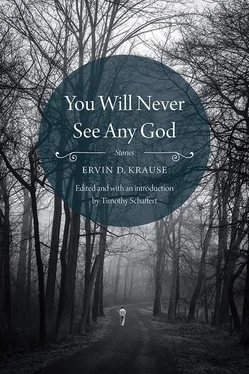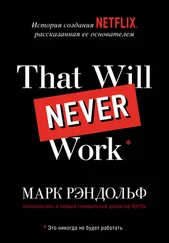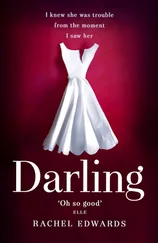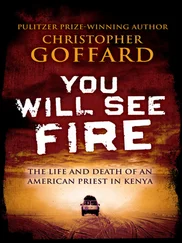“They haven’t got him yet,” Leonard said, the first words in all that way.
“How do you know?” his wife asked.
“Gavin wouldn’t be sitting there if they had.”
They went the two and a half miles to the farm and down the long lane from the gravel road.
“Oh, the cattle are down this way!” the wife said, delighted, and it was true, the large herd spread on both sides of the creek, near the farmstead. “We’ve got to take some pictures.”
“That will be nice,” he said, the sullenness still on him.
The brother, Melvin, and the old hired man who came whenever Melvin needed him worked on the seeder; there were soybeans to be replanted and the seeder was pulled in the middle of the yard.
“The cattle are down this way,” the wife said to them. “Is it all right if I take some pictures of them?”
“Take as many as you want,” Melvin said, getting up from under the machine and looking himself. The pasture was a mile long, and narrow, for it flanked the creek on both sides. The cattle were young and tended toward wildness, newly brought from the Nebraska range. The first thing they’d done after the 160 head had been unloaded was to go to the far end of the pasture, the mile away, and herd up there. Melvin had explained it to them when they went out to count the cattle one time. “The only experience they’ve had with barns and buildings is with things that hurt, vaccination, castration, branding, and so naturally they want to stay away from anything that looks like buildings.”
And they had until now.
“Well maybe the grass is getting short up at the other end,” Melvin said, although he knew and Leonard knew that could not be.
The wife was excited and pleased. She got the camera and went out by the fence and the beautiful Hereford calves lifted their heads and sniffed, and she took the picture, with at least a hundred heads, white-faced and white ears, pointing at her.
“I thought I’d never get a picture of them,” she said, back at the yard, pleased with everything.
Leonard sat on the porch and slipped the oiled cloth along the spine of the Marlin rifle. Sullenly he cleaned the gun, although he had cleaned it the day before after shooting the six pigeons up at the other place that Melvin farmed. He knew that he was sullen, and told himself he could not help it, could not. The bandage on his neck bothered him, the bandage covering the latest biopsy only three days old. He cranked his head and touched the wad on his neck.
“Don’t pull at that, please, Len,” his wife said.
“Aaah,” he muttered, slipped the cloth the length of the rifle, noted appreciatively the steel gleam, the hard steel bolt reflecting neither figure nor shadow, only light.
“Aah,” he muttered again, touching the lump of bandage with his fingertips. The cold lumps of frozen things in himself, those lumps of growing cancers, and the hot unhealthy burn of the radiation, neither good, he thought, both or either would kill him, frozen and burning all at once, and if he thought of it he could feel them both, he believed, truly feel them crawl in his tissues, in his marrow, that dark cold cancer in him and the glow of the radiation; condemned to death quite surely, and he did not know how or why. Nor did anyone.
Snap! the bolt went shut, beautiful, slick and sliding elegantly the Marlin.22 that he had cleaned up and made good again. The shining steel-colored bolt slipped open and shut and open again beneath his finger touch. He looked down the barrel and the beautiful grooves spiraling down to the distant small opening where the small bullet entered, and closed the bolt.
“Think I’ll get a pigeon or two,” he said by way of explanation to the women, his wife working with the flowers in the front yard, his mother sitting in the lawn rocking chair. He took the new box of bullets, fingered out six and filled the clip, snapped the clip in, liked the way the bolt slid forward, seated the slender little bullet, closed solidly. Now truly a weapon.
“Na, there he goes again,” the mother said, “shooting birds and rabbits. Murderer,” laughing a little, looking at the wife to see if she would smile.
He turned sharply on his mother, really snarled, “Mind your own business, goddamn it,” feeling a ridge of blood thunder in his forehead, his arm tremble, and a burning beneath the bandage. Murderer! Murdered would be better, he thought.
“Well, Leonard,” his wife said chidingly, and softly too, lest he get really angry. The mother looked away as if she had not heard; she had had five sons and had borne many ferocious asides.
He went through the gate, carrying the good-feeling rifle. The dog wanted to follow; he sent him back. In deadly quiet he moved up along the heavy windbreak, any slight sounds he had to make completely hidden by the crash and bang of the hogs feeding in the near hog yard. Beyond the box elders he heard the chattering, unmistakable, of squirrels. He wondered absently if this was a female with young, knew they were almost impossible to tell apart from the males, and he had seen a dozen or so in the last week, cavorting foolishly and openly around the corncrib. Whatever it was, it would have to take its chances, for what followed would be purely by design. He slid up in the protection of a tree, peered gingerly forward, could tell finally the movement high in a far maple, the scolding squirrel, head and body pointed straight down the trunk.
He brought the rifle up, not moving fast, careful to avoid startling motion, traced the barrel at the squirrel thirty yards away, planted the rear sight on him, on his neck, lowered the blade of the front sight so that it rested at the bottom of the rear, exactly as he had tested it from a hundred practice shots, followed the squirrel perhaps six inches or so as it came down the trunk, and worked back on the tender trigger.
Interesting, always interesting, he thought, plucking at the bandage on his neck that itched and was hot suddenly, and hurt worse after he plucked at it, interesting to see that change, the profound and remarkable alteration that the snap of one small.22 bullet could make. The birds fled, a quiet dropped on the windbreak, only the impervious hogs went on completely unaffected. The target itself, the squirrel, headed forward, still facing downward, but now as if its whole will and effort must be to return, to go upward, and the weight of ten planets sucking it with deadly force. A sag, tail, fur, fat, everything wrinkled downward, and that enormous gravity drew it down, the pads of feet dug grimly into the bark. He thought for a moment he would have to shoot again but then with a slipping suddenness the brown squirrel skittered down the bark, crashed with astonishing heaviness into the bush beneath the tree.
The lurking dog came up and seized the squirrel, and Leonard spoke sharply, and the dog retreated. The squirrel was male, very heavy. Fed on Iowa corn, it should be, Leonard thought. The bullet had gone in an inch in back of the skull. It had been dead from the moment of the shot, he thought, and had hung on not even reflexively, only the feet thinking reflexively.
He picked it up by the tail, studied the dulled round eyes without wanting to. “Palliation,” he said aloud, and threw the squirrel right at the dog. The dog hopped away, turned away from him, the animal uncertain if he were angry with him.
“Poor sensitive beast,” he muttered viciously at the dog, thinking — perhaps you need palliation too, poor creature.
The woods were quiet, and very hot now. The gnats, fat and hairy and insistent, thick as miniature buffalo and shaped like them, were everywhere. Leonard went out, skirted the old machine shed, the dog coming after, forgetting the squirrel now, the dog fat and useless although not old, it ever useless, but interested in hunting, nothing could make it move as could the appearance of a gun.
Читать дальше











